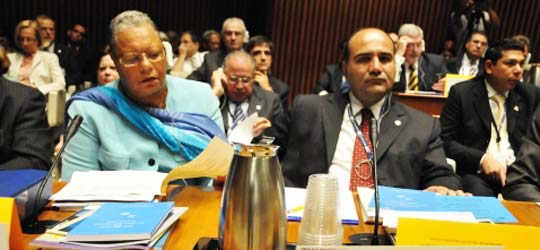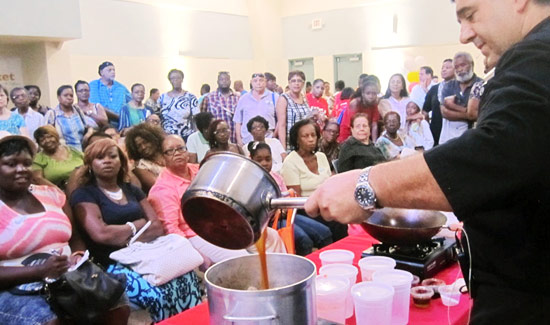 WASHINGTON, DC – At the Fiftieth Directing Council Meeting of the Pan American Health Organisation (PAHO), the Chief Medical Officer of The Bahamas asked the global health body to revisit its newly adopted Strategy and Plan of Action for the Elimination of Mother-to-child Transmission of HIV and Congenital Syphilis, and “design a programme that is all-encompassing.”
WASHINGTON, DC – At the Fiftieth Directing Council Meeting of the Pan American Health Organisation (PAHO), the Chief Medical Officer of The Bahamas asked the global health body to revisit its newly adopted Strategy and Plan of Action for the Elimination of Mother-to-child Transmission of HIV and Congenital Syphilis, and “design a programme that is all-encompassing.”
The reduction in mother to child transmission of HIV is an area in which The Bahamas has excelled, according to Dr. Merceline Dahl-Regis, CMO and part of The Bahamas delegation to the meeting led by Ambassador CA Smith.
“We have made significant progress with the management of vertical transmission [of HIV] – from mother to child,” Dr. Dahl-Regis said. “However, we have many challenges. We’d very much like to have zero vertical transmission [of HIV together with congenital syphilis], and we think we can achieve that.”
New Strategy PAHO reported that each year in Latin America and the Caribbean, 160,000 people contract congenital syphilis and HIV, 9,000 of them children. Through the newly adopted strategy, countries will seek to eliminate these diseases by 2015.
In responding to the adoption of the strategy, Dr. Dahl-Regis insisted that any strategy for prevention of mother to child transmission must incorporate adherence to anti-retrovirals. She noted that mothers have often complained that the medicines make them feel ill, that some are not in the best of nutritional health, and that there are a plethora of other social “events” that impact the mothers’ decision with respect to taking the medicines.
She said any new strategy must involve effective contact tracing, not only for the administration of the treatments or for the identification of the partners, but also in terms of looking at where mothers are, following up with them, having them deliver in hospitals, and to evaluate the offspring and continue follow-up.
“This strategy, the PMTCT [Prevention of Mother To Child Transmission], would be better administered if we linked it to the immunisation schedules of children, because you have an infrastructure there [and] if we link it with the social communications that we used with the elimination strategy for congenital rubella.”
“It could be linked also to just maternal and child health services. The baby has to be born, and the earlier we take the approach that this programme encompasses a period from preconception [up to 45] for women and [up to 65, perhaps as high as 80] for men.”
“So I’m asking the organisation to really revisit the components of the strategy and to design an implementation programme that is all-encompassing.”
On Reinfection The CMO noted that there had been many meetings over the strategy that currently guides efforts aimed at stopping the transmission of these illnesses, and that there is a view that this strategy needs to be “revisited,” particularly with a view to increasing the involvement of men.
“Many women – during the pregnancy, before and after the pregnancy – are reinfected,” she said. “To that end I think we need a specified male programme, not only to treat the males, but also to share with them the information that can lead to some behaviour changes.”
“They are not readily accepting the use of condoms during pregnancy [or] during the reproductive cycle. If we can impart information that condoms are useful for prevention of reinfection during the pregnancy period, it will be a step in the right direction.”
On Sexual Health Strategy Dr. Dahl-Regis noted that it is easier and more productive to begin exposing people to sexual health strategies and messages at early ages, and not to wait until unhealthy or dangerous behaviours are entrenched in sexual practices to try and interrupt them.
“If we started promoting condom use for early sexual initiations, that would be useful,” she said. “In the Caribbean, the religious community is promoting abstinence [but] the practice is not one of abstinence.”
She noted that because of the influence of the religious community, the messages young people receive about abstinence do not encourage or promote condom use. In fact, she said, the view persists that condom use detracts from the sexual experience.
“So I think its messaging, effective communication and attention to behaviour change communication at an earlier ages,” Dr. Dahl-Regis said, when asked about proper strategic priorities. “Both men and women.”
By Khyle Quincy Parker
Embassy of The Bahamas



